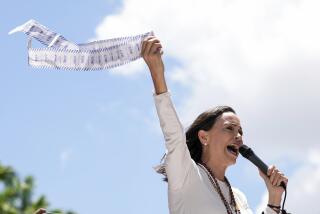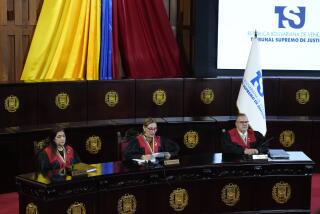President of Nigeria Holds Sizable Lead
- Share via
ABUJA, Nigeria — As Nigerians waited nervously to see whether their nation could for the first time move from one civilian government to another, President Olusegun Obasanjo led his nearest challenger by a large margin Sunday in initial returns from nationwide elections.
With his party continuing to make gains in key regions, Obasanjo had raked in about 75% of the 10 million votes counted -- about 20% of the total cast Saturday -- with Muhammadu Buhari, his main rival, receiving 20%.
But questions lingered over whether Buhari and incumbents, defeated in gubernatorial races by candidates of Obasanjo’s People’s Democratic Party, or PDP, will accept the results or urge supporters to wreak havoc in the streets.
Local and international election monitors said that in some regions, especially the oil-rich Niger Delta, PDP victories appeared to be tainted by fraud. In many wards of the troubled Delta, voting did not take place at many sites, yet final results showed an unusually high turnout.
*
‘Ludicrous Victories’
“It looks like someone is over-egging the pudding,” said Patrick Smith, editor of Africa Confidential, a political newsletter. “Where there might have been moderate victories, they’re looking like ludicrous victories.”
PDP candidates appeared to be winning state houses held by the Alliance for Democracy, a party dominated by ethnic Yorubas that did not field a presidential candidate to make it easier for kinsman Obasanjo to win. Analysts said party governors were likely casualties of that decision.
Saturday’s elections in all 36 of Nigeria’s states were watched by thousands of foreign and local observers, who crisscrossed this unruly country of about 250 ethnic groups.
Beginning today, they plan to deliver their verdicts on whether the balloting was substantially fair or flawed.
Mainly negative reviews by the observers would lend support to Buhari and losers of gubernatorial races, who might call for fresh elections -- or ask their supporters to simply reject the results.
Last week, Buhari, a former coup leader who deposed an elected president in 1983, called on Nigerians to take “mass action” if Saturday’s vote was tainted the way he alleged April 12 legislative elections were. The phrase is interpreted here as meaning huge, often violent, demonstrations.
On Sunday, many Nigerians watching the vote tallies were trying to answer a key question: What standards must be met before the results of a national election can be regarded as legitimate?
By Nigerian standards, the elections were generally peaceful, apart from a few deaths reported in the Delta region, where residents are battling foreign companies and their own soldiers for a chunk of the abundant oil wealth.
Observers and journalists reported that soldiers shot and killed six people Saturday at a polling place in the Delta. Observers said the soldiers opened fire with semiautomatic weapons after the youths refused orders to leave the site.
Since Obasanjo was elected in a militarily supervised poll in 1999, about 10,000 Nigerians have been killed in ethnic and religious violence.
Preliminary results Sunday revealed that Buhari, a northern Muslim, received most of his support from the predominantly Muslim north. Voters from Nigeria’s middle belt and south appeared to have voted in large numbers for Obasanjo, a southern Christian.
Hakeem Baba-Ahmed, secretary of the Independent National Electoral Commission, said election regulators were being cautious about releasing official results, especially in gubernatorial races.
In an attempt to steal elections, some defeated governors had announced on radio stations -- which they own -- that they had won reelection, he said.
*
Fraud Is Denied
Baba-Ahmed strongly rebutted allegations that high voter turnout in some states amounted to fraud.
“If the argument is that it is not possible to receive 90% of the vote in one [constituency], then we need factual evidence showing that,” he said.
“It is a sad reflection of the level of confidence in Nigerian politics.”
Baba-Ahmed said candidates who felt defrauded should follow procedures by filing appeals with electoral courts headed by independent judges.
“We think it is better to head to the courts than to head for the streets,” he said.
More to Read
Sign up for Essential California
The most important California stories and recommendations in your inbox every morning.
You may occasionally receive promotional content from the Los Angeles Times.













